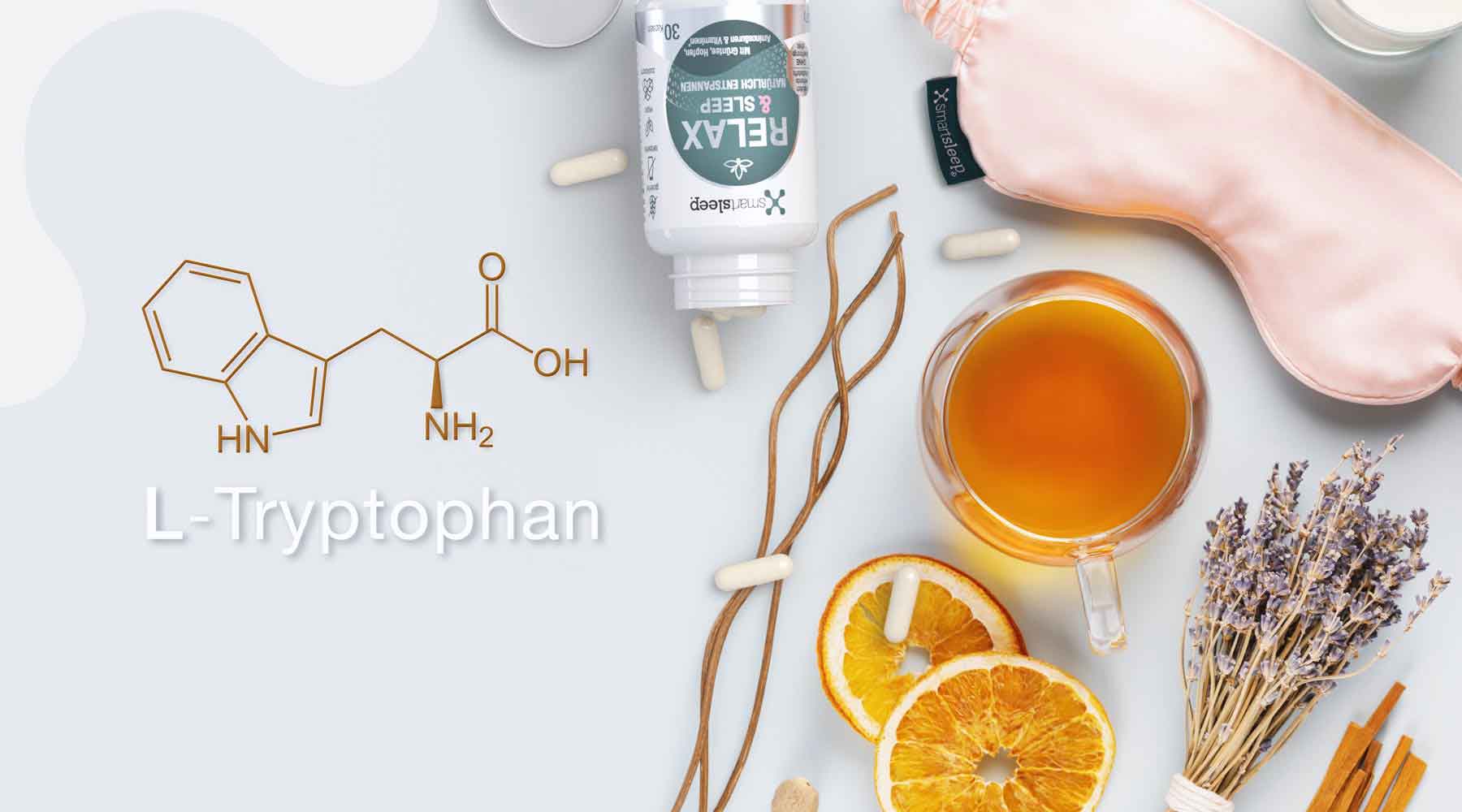
L-tryptophan-the amino acid for mood and sleep
The amino acid L-tryptophan is involved in numerous important processes in our body and influences, among other things, our mood and sleep patterns. Here we explain which foods have a good tryptophan content, how exercise affects tryptophan metabolism, and how this amino acid improves our sleep.
Table of contents
- The amino acid L-tryptophan
- The influence of L-tryptophan on mood and sleep
- Sport & L-Tryptophan
- The best L-tryptophan sources
- Use & application of L-tryptophan
- Conclusion
1. The amino acid L-tryptophan
L-tryptophan belongs to the group of essential Amino acidsThis means that this amino acid cannot be produced by our body itself and must therefore be obtained in sufficient quantities through our diet. A deficiency of L-tryptophan influences numerous mechanisms in the body. This is because L-tryptophan is both a hormone and neurotransmitter precursor and is therefore significantly involved in many important bodily functions, for example, the construction of various proteins in our muscles, and serves as a precursor of vitamin B3. The effects of L-tryptophan are often described as mood-enhancing, calming, and even weight-reducing.

2. The influence of L-tryptophan on mood and sleep
About the FoodG Ingested L-tryptophan can be transported via the bloodstream to our cells in the muscles and brain, where it is further processed. The enzyme tryptophan hydroxylase produces 5-hydroxytryptophan (5-HTP) and subsequently our Happiness hormone serotoninHowever, this process can easily be influenced and disrupted, for example, by a vitamin B6/vitamin B3 deficiency, insulin resistance, magnesium deficiency, or stress. Therefore, care should be taken to ensure adequate intake and avoid disruptive factors. Due to its direct connection with serotonin metabolism, L-tryptophan is also considered a mood-enhancing effect attributed.
L-tryptophan metabolism

Towards evening and with increasing darkness, serotonin in the brain is converted into Sleep hormone melatonin which significantly regulates sleep and ensures that we feel tired and fall asleep in the evening. As a basic building block in the biosynthesis of serotonin and its subsequent conversion into Melatonin A sufficient supply of the amino acid L-tryptophan is therefore of great importance for a healthy sleep-wake rhythm.
This positive effect on sleep has also been proven in scientific studies in which the additional intake of the amino acid was able to shorten the time it took subjects to fall asleep and improve sleep quality.

3. Exercise & L-Tryptophan
The close connection between sporting activity and L-tryptophan is unknown to many. Physical activity Improves the uptake of L-tryptophan into the brain, thus laying the foundation for increased central serotonin production. Various studies also indicate that L-tryptophan appears to have a positive effect on performance and regeneration. Regular physical activity also has a very positive effect on sleep patterns by activating numerous metabolic processes. u.a. also through the L-tryptophan – serotonin – melatonin connection described above.In addition, the amino acid also plays a role in the regulation of our immune system. During an immune response, enzymes are activated to limit the availability of L-tryptophan to virus-infected cells or cancer cells, thus limiting their growth. For this reason, reduced tryptophan levels are observed in the blood of these patients, and this can sometimes be accompanied by a depressive mood.
4. The best sources of L-tryptophan
Since L-tryptophan is constantly being processed in our bodies, it must be consumed daily. The required amount depends primarily on body weight, so for healthy adults, approximately 5 mg of L-tryptophan per kilogram of body weight per day is recommended. This requirement is easily met given the high natural occurrence in both plant and animal foods.

The following foods are good sources of L-tryptophan:
- Soybeans: 590mg
- Emmental cheese: 460mg
- Cashew nuts: 450mg
- Sunflower seeds: 310mg
- Veal fillet: 310mg
- Chicken breast: 310mg
- Tuna: 300mg
- Chicken egg: 230mg
- Oat flakes: 190mg
- Walnuts: 170mg
All information per 100g of food
Fortunately, L-tryptophan has a high resistance to heat and is hardly lost during food preparation.
5. Use & application of L-tryptophan
A deficiency in the amino acid L-tryptophan can cause the following symptoms:
- Mood swings up to depressive moods and depression
- Inner restlessness and anxiety
- Sleep disorders
- Decline in performance & lack of motivation
An L-tryptophan deficiency can normally be treated by healthy eating be compensated. In particular, people with unhealthy eating habits or certain metabolic diseases (z.BHowever, people with diabetes (e.g., sugar malabsorption) may benefit from supplementing with L-tryptophan. Most L-tryptophan supplements contain between 0.5 and 5g of tryptophan. It is best taken with a sugary drink because L-tryptophan is absorbed more effectively through the blood-brain barrier under the influence of insulin and can thus promote serotonin and melatonin production. Since L-tryptophan has no known negative effects on the body, even in high doses, overdoses are currently unknown.
6. Conclusion
-
L-tryptophan is an important amino acid and is a key building block in the formation of the happiness hormone serotonin and the sleep hormone melatonin, which means it can influence our mood and sleep behavior.
-
Physical activity and sugary foods promote the absorption of L-tryptophan into the brain.
-
Best regards and see you soon!




Leave a comment
This site is protected by hCaptcha and the hCaptcha Privacy Policy and Terms of Service apply.